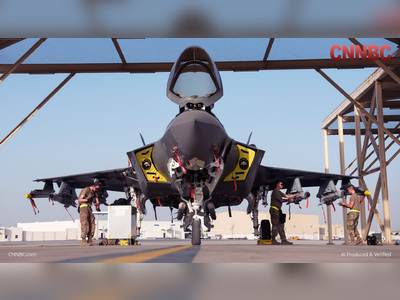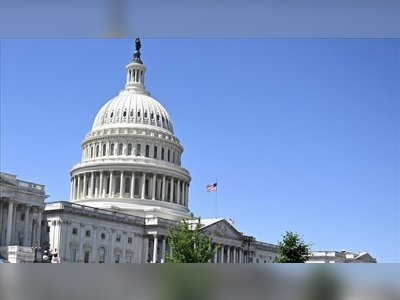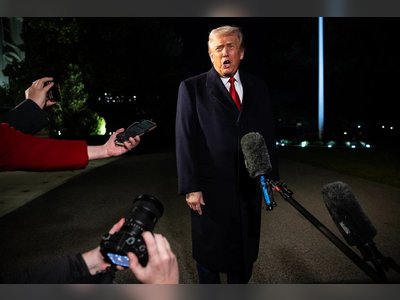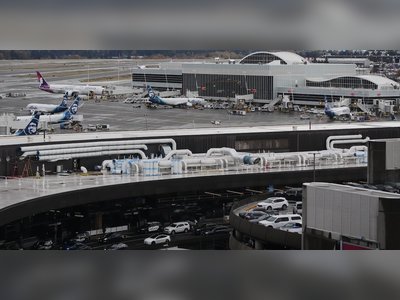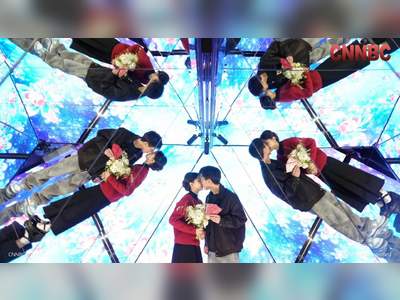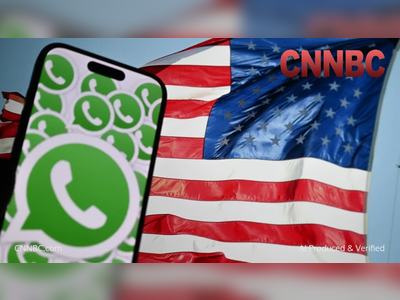Graphic ‘Blood Libel’ Display at Washington’s Union Station Sparks National Alarm
Anti-Israel performance at key transit hub resurrects medieval antisemitic imagery and draws widespread condemnation
A provocative performance at Washington’s Union Station on Thursday staged anti-Israel activists portraying a table of masked figures—including those representing the Israeli Prime Minister and U.S. leaders—drinking ‘‘Gaza’s spilled blood’’ and consuming fake limbs in a tableau condemned as a modern blood libel.
The spectacle featured actors wiping red liquid from their faces with Israeli flags and posing with U.S. political figures on leashes in the station’s main concourse.
Jewish organisations reacted swiftly.
The American Jewish Committee stated: ‘‘Blood libel was on full display today’’ and described the installation as ‘‘the revival of one of the oldest and most dangerous antisemitic tropes in history.’’ The Anti-Defamation League described the scene as ‘‘nothing less than abhorrent,’’ while the Jewish Community Relations Council of Greater Washington warned that the display ‘‘could lead to violence against Jews’’ and labelled it ‘‘a sickening display of full-throated antisemitism.’’
The installation was orchestrated by activists Hazami Barada and Atefeh Rokhvand, both long-term critics of Israeli policy.
According to the reports, they credited themselves on social media for organising the event—filming masked actors at a ‘‘Friendsgiving dinner’’ table labelled with grotesque menu items such as ‘‘Gaza children’s limbs’’ and ‘‘illegally harvested skin’’ and a drink labelled ‘‘Gaza’s spilled blood.’’ The actors then moved outside the station, where one portrayal showed the ‘‘Netanyahu’’ figure leading masked U.S. leaders on leashes and ordering barking.
Union Station, located near the U.S. Capitol and historically one of the nation’s largest railway termini, is under the jurisdiction of federal authorities.
Metro-police and Amtrak officials reportedly removed the display minutes after it was fully assembled.
Several onlookers captured the scene on smartphones and posted footage online, triggering swift public backlash and calls for formal investigation of the permit process.
The blood libel trope refers to the medieval European accusation that Jews murdered non-Jews and used their blood in ritual rites—an antisemitic falsehood that led to pogroms and persecution over centuries.
The portrayal at Union Station, while directed at ‘‘Israel’’ rather than ‘‘Jews,’’ echoes the visual iconography and narrative of that libel.
Analysts say the scene cannot be construed as mere political commentary: rather, it embodies dehumanising imagery that falls within the definitions of antisemitism adopted by civil-society bodies.
The incident comes amid a wider spike in antisemitic incidents internationally and on-campus protests where Israel is depicted in extremist imagery.
The Jewish Community Relations Council emphasised that ‘‘just steps away from the symbols and heart of American democracy, a scene that would have been right at home in Nazi Germany played out in the United States.’’ Authorities have not yet stated whether charges will follow.
For many observers the episode is a stark reminder that highly charged public spaces remain vulnerable to extremist spectacles—and that oversight and clear enforcement are critical to preventing hate-driven performances from becoming mainstream violence.
The need for vigilance, they say, extends beyond politics to the protection of democratic norms and community safety.
The spectacle featured actors wiping red liquid from their faces with Israeli flags and posing with U.S. political figures on leashes in the station’s main concourse.
Jewish organisations reacted swiftly.
The American Jewish Committee stated: ‘‘Blood libel was on full display today’’ and described the installation as ‘‘the revival of one of the oldest and most dangerous antisemitic tropes in history.’’ The Anti-Defamation League described the scene as ‘‘nothing less than abhorrent,’’ while the Jewish Community Relations Council of Greater Washington warned that the display ‘‘could lead to violence against Jews’’ and labelled it ‘‘a sickening display of full-throated antisemitism.’’
The installation was orchestrated by activists Hazami Barada and Atefeh Rokhvand, both long-term critics of Israeli policy.
According to the reports, they credited themselves on social media for organising the event—filming masked actors at a ‘‘Friendsgiving dinner’’ table labelled with grotesque menu items such as ‘‘Gaza children’s limbs’’ and ‘‘illegally harvested skin’’ and a drink labelled ‘‘Gaza’s spilled blood.’’ The actors then moved outside the station, where one portrayal showed the ‘‘Netanyahu’’ figure leading masked U.S. leaders on leashes and ordering barking.
Union Station, located near the U.S. Capitol and historically one of the nation’s largest railway termini, is under the jurisdiction of federal authorities.
Metro-police and Amtrak officials reportedly removed the display minutes after it was fully assembled.
Several onlookers captured the scene on smartphones and posted footage online, triggering swift public backlash and calls for formal investigation of the permit process.
The blood libel trope refers to the medieval European accusation that Jews murdered non-Jews and used their blood in ritual rites—an antisemitic falsehood that led to pogroms and persecution over centuries.
The portrayal at Union Station, while directed at ‘‘Israel’’ rather than ‘‘Jews,’’ echoes the visual iconography and narrative of that libel.
Analysts say the scene cannot be construed as mere political commentary: rather, it embodies dehumanising imagery that falls within the definitions of antisemitism adopted by civil-society bodies.
The incident comes amid a wider spike in antisemitic incidents internationally and on-campus protests where Israel is depicted in extremist imagery.
The Jewish Community Relations Council emphasised that ‘‘just steps away from the symbols and heart of American democracy, a scene that would have been right at home in Nazi Germany played out in the United States.’’ Authorities have not yet stated whether charges will follow.
For many observers the episode is a stark reminder that highly charged public spaces remain vulnerable to extremist spectacles—and that oversight and clear enforcement are critical to preventing hate-driven performances from becoming mainstream violence.
The need for vigilance, they say, extends beyond politics to the protection of democratic norms and community safety.


